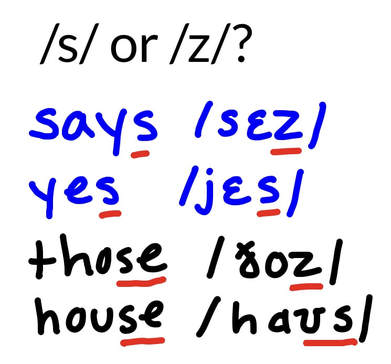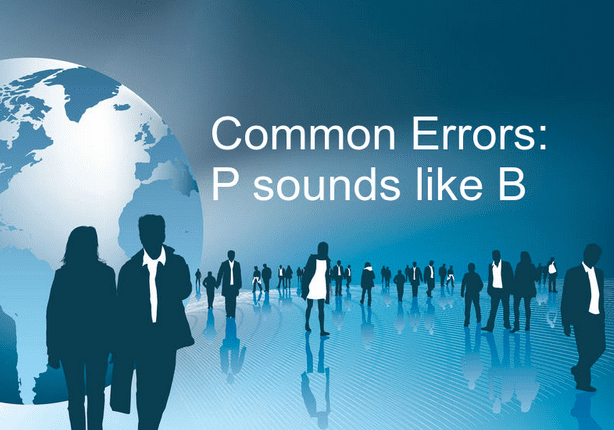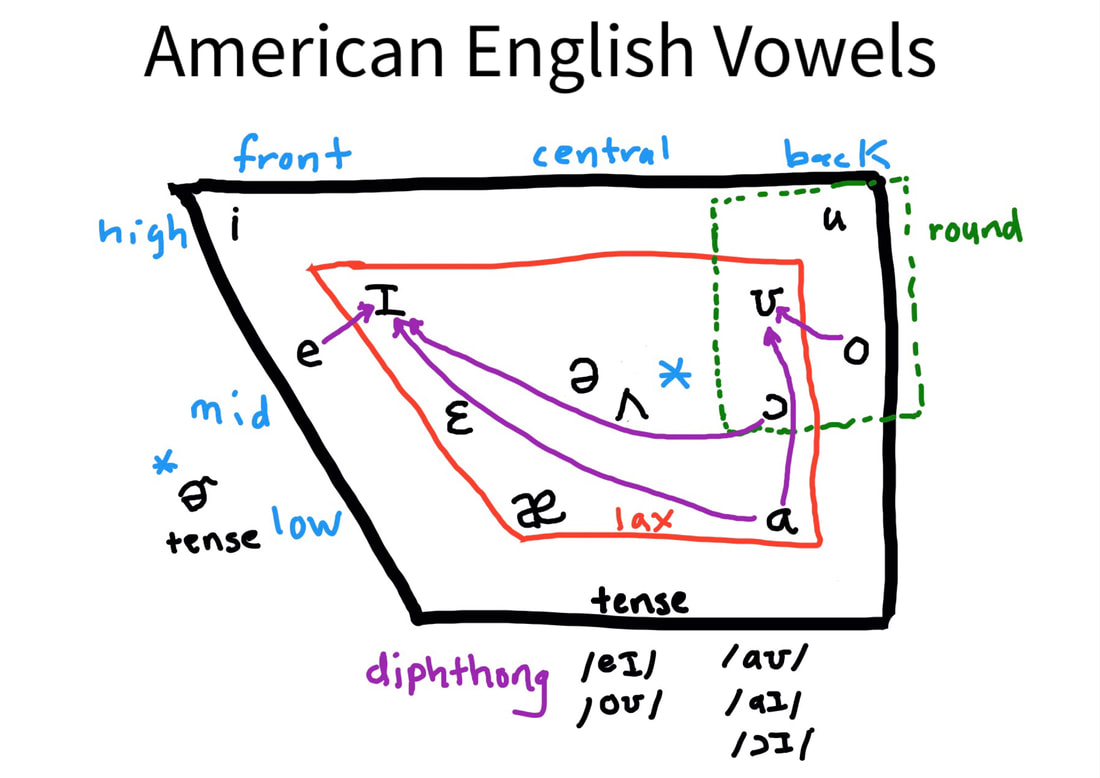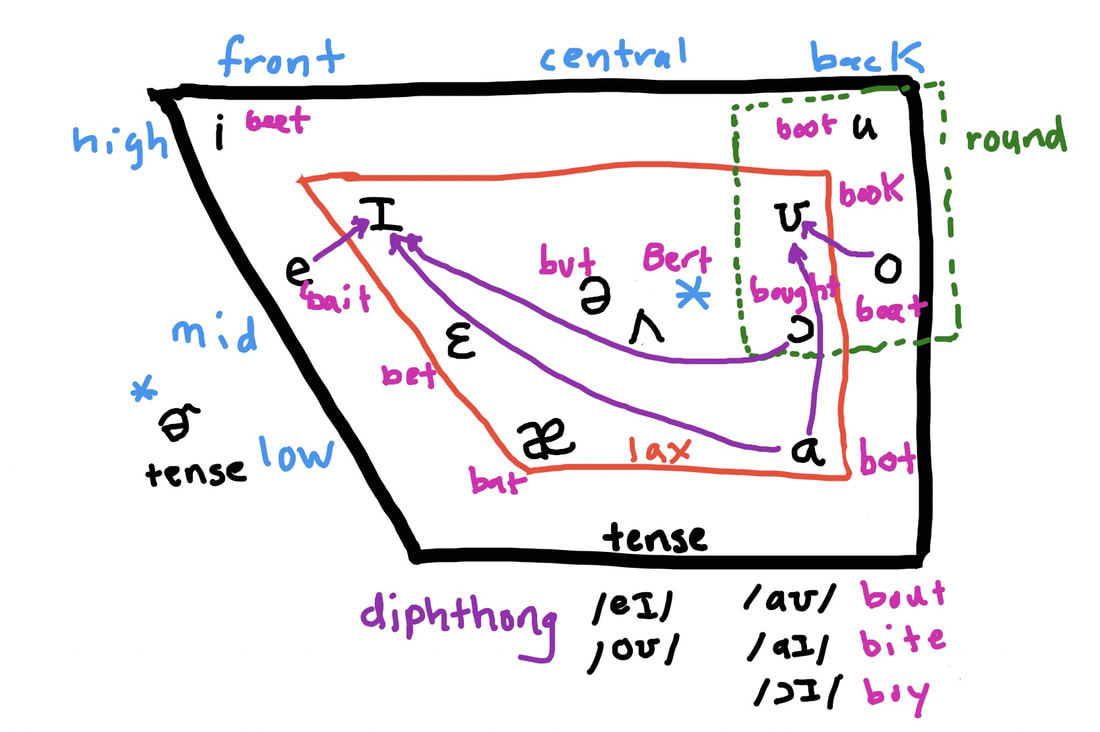|
One of the most frequently occurring accent error patterns is using and "s" sound at the end of a word when you should be saying a "z" sound. Use the videos below to learn how to correct this error pattern, and how to know when letter s says "s" and when it says "z." Guidelines for pronouncing letter "s" at the ends of words: If you see an s or se at the end of the word, it is usually pronounce /z/. Check the dictionary to be sure. Spelled letters -ss, say /s/ examples: glass, grass, less, guess Spelled letters -ce, say /s/ examples: ice, place, space, face Spelled letter -s, Usually /z/ examples: was, is, goes, his, as, eyes (say "waz, iz, goez, hiz, az, eyez") Spelled letter -s, (sometimes s) examples: yes, us Spelled letters -se, Usually /z/ examples: those, use, these, please (say "thoz, uz, thez, pleaaz") Spelled letters -se, (sometimes s) examples: house, goose, lease
0 Comments
If you speak Arabic, Indian English, French, Italian, Russian, Vietnamese, Tagalog, German, Dutch, Czech, Hungarian, Ilocano, Indonesian, Portuguese, Urdu, Romanian, Tamil, Hindi, Gujarati, Bengali, Polish, Punjabi, Burmese, Bulgarian or Yoruba as your first language, you may have an error pattern when you say words in English that start with the letter P. Speakers from these language backgrounds will say the “p” sound as an unaspirated p, which means it does not release the stopped air. This makes it sound like a ‘b” to the American listener. For example, the word pie sounds more like bye. Try saying the words below. Put your hand in front of your mouth to make sure you release the stopped air. You should feel a puff of air on your hand.
For more recordings and video practice, subscribe to the full online practice site. An important step in being understood and sounding more American is learning to use American intonation. Intonation is the music of speech, the stress patterns or rhythms, the pitch changes, and the vocal tone. Intonation is complex, but there are some simple rules that you can learn which will help you understand and use correct American intonation. Word-Level Intonation For words with more than one syllable, we have an intonation pattern within the word. One syllable will have the main stress. This syllable will have a vowel sound which is held longer, has a higher pitch, and a clear vowel tone. Listen to the examples below. Can you hear which syllable has the stress?
Stress is marked with a small diacritic (a line similar to an apostrophe) before the stressed syllable. For example, on the word together, the stress falls on the second syllable "ge." It is easiest to listen to the word and repeat, following the stress pattern that you hear. For access to thousands of recordings of common words, technical and business words, and words sorted by sound and stress pattern, consider a subscription to our full online practice site. One final note on word stress - you are most likely using it correctly for most words. Error patterns are most likely to occur on words that you learned through reading rather than listening, as well as words that have a different stress pattern in the dialect of English that you first learned. For example, many dialects of English including Indian English and English spoken in many parts of Africa and Europe are influenced by British English, which has some differences from American English. For example, British English will stress the first syllable of French loan words, such as ballet and cafe; whereas American English will stress the second syllable, ballet and cafe.
Some languages have consistent stress patterns on words. For example, in Spanish, the last syllable is always stressed, unless the word ends with an s, n, or vowel, in which case the stress in on the second-to-last syllable. If your native language typically stresses the first syllable of a word, you may be likely to have errors on American English words that have syllable stress on the second or third syllables. You can find words sorted by syllable stress for your practice on our full site. One aspect all accents share is a tendency to make errors when pronouncing American English vowels. The patterns of pronunciation are influenced by the vowel system in your native language. Vowels are especially difficult due to the fact that the letters we use to represent vowel sounds are inconsistent and do not provide us with a means for describing the sounds. A useful way to gain understanding of American English vowels is to look at how they are formed in the mouth. The position of the tongue, both front-to-back and high-to-low, is the primary factor in vowel shaping. In addition, we use rounded or non-rounded lips, and tense or lax lip and facial muscles. The chart below shows these elements for each of the vowel sounds. Click on the symbols to hear the vowel sounds. In the top left corner of the chart, we find /i/, or "Vowel ee," as in eat. This vowel has tense lips, a high front tongue and no lip rounding. Notice that /ɪ/, "Vowel ɪ," as in it, also has a high front tongue, but is slightly lower and further back than vowel ee. The lips and face are more relaxed (less of a smile) for this sound. Because they are made in a similar way and sound similar, many people substitute vowel ee for vowel ɪ. Their native language may not contain vowel ɪ, and vowel ee is the closest vowel. You can read more about producing these two sounds here, and watch a video. You can practice words with these sounds using free online audio recordings here. The diagram above uses IPA symbols to represent the sounds. This website uses a combination of IPA symbols and our own naming system for the vowel sounds. Below is a list of the vowels, their IPA symbol and name, and example words and spellings. Click on the IPA symbol or vowel name to hear the vowel sound and a sample word. For more examples of common words with these vowels and recordings to practice, check out our online courses.
In addition to these single vowel sounds, or monophthongs, we also slide from one vowel to the next in some words. These 2-vowel slides are called diphthongs, and are represented in the graphic below by the arrows pointing from the first vowel in the slide to the second. Also included here are words with each of the vowels. You can listen to these vowels below.
New to this page? You may want to start here. The American R can be a challenging sound for non-native speakers, even those who speak other English dialects. In some accents, the r sound is rolled or trilled. In others, it sounds more like vowel schwa, or the sound "uh." Did you know that the "r" sound is different depending on where it falls in the word? You may have no trouble saying the "r" in red or really, but struggle with the "r" sounds in bird or forever.
Whatever your difficulty, this may be a sound that needs practice at the phoneme and syllable level. Rather than trying to start by saying words with r, practice the sound by itself and in nonsense syllables. You might find the trouble is not with making this sound, but rather with breaking the habits of your old pronunciation in words. Use the recordings below to try the sound, syllables, and words in a new way. |
Categories
All
Archives
May 2024
Have Questions?
Get A Free Consultation We offer a free 30-minute phone consultation. Schedule yours now. |







 RSS Feed
RSS Feed

